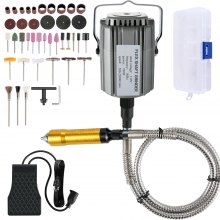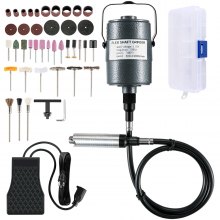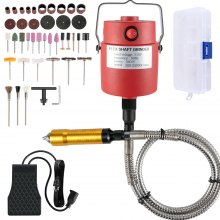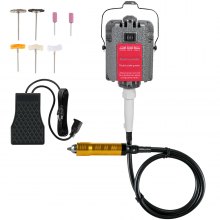Precision and Power: VEVOR Flex Shafts for Every Crafting Need
A flexible shaft, also known as a flex shaft, is a tool used to transfer rotational motion between two non-fixed objects. It comprises a flexible yet stiff, revolving wire rope or coil.
It might or might not include a covering that rotates but also bends. It can transmit significant power with low power or merely motion. Flex shafts from VEVOR's line offer the reliable performance and exacting accuracy your job requires.
Components of a Flex Shaft System
A flex shaft system is an adaptable instrument frequently used in sculpting, woodworking, jewelry making, and many other crafts and professions. It consists of a few essential parts that combine to provide exact control and fast rotational power in a small container.
Motor
The motor unit is typically suspended from a wall rack or rests immediately on the jeweler's workbench. The motor must only be out of the way; you shouldn't have to touch it.
Handpiece
The flexible shaft terminates in a metal segment that serves as the handpiece. When working on jewelry, the user holds this instrument portion in their dominant hand.
The handpiece's tip features a gripping mechanism that can securely hold onto a wide range of tips, burs, wheels, and other accessories.
Flexible Shaft
A flexible cable extending several feet from the motor to the work area enables work from any angle.
Foot Pedal
Using the foot pedal, the user starts the motor while seated at their bench and grasping the handpiece. The accessory carried by the handpiece's tip will spin quickly when the motor depresses the foot pedal.
Chuck Key
A chuck key is a small tool that opens and tightens the handpiece's gripping mechanism. This makes it simple and quick for the user to switch out accessories.
Uses of a Jeweler’s Flex Shaft
The jeweler's flex shaft is essential in jewelry making and maintenance. Several applications for this adaptable equipment can significantly improve the accuracy, effectiveness, and caliber of the job that is produced. Some main applications for a jeweler's flex shaft are listed below.
Finishing
Small attachment heads called burs are used with flex shafts. They are usually made of carbide steel or other extremely hard materials. Metal can be shaped, cut, ground, or otherwise worked with them. Burs are available for every possible task. Additionally, you may sand metal faster with several sandpaper-like accessories than with a manual sander.
Polishing
Use felt or silicone flex shaft polishing heads or small buffing wheel attachments for metal polishing. Proceed to polish your completed jewelry item by spinning your polishing head immediately over your silver polishing compound.
Drilling
Making a power drill out of a flex shaft is among the simplest things you can imagine doing. Tiny drill bit connections can be used to pierce openings in metal jewelry.
When drilling into any metal, ensure you have a wooden scrap block underneath it. Some jewelers are okay with having holes drilled in their bench pins. However, you risk damaging your tabletop, workbench block, and anvil if you drill straight into them.
Wax Shaping
Jewelers can shape wax models for different casting procedures with wax carving burs.
Stone Setting
Many burs are made to help in stone settings and setting settings for many kinds of jewelry.
Benefits of Flex Shaft
Given their precision and versatility, flex shafts are valued in various industries, including dentistry, woodworking, and jewelry production. Due to their many benefits, flex shafts are invaluable tools in industrial and recreational situations. The following are some of the main advantages of using flex shafts.
Versatility
Flex shaft versatility is among its most important benefits. A single flex shaft may accomplish numerous tasks with a variety of attachments, such as grinders, drills, engravers, and polishers, in its collection.
Increased Reach and Flexibility
Because of the shaft's flexible structure, users can access difficult-to-reach places and angles that are challenging or impossible to reach with stiff equipment. This adaptability is particularly helpful in tight or complicated areas.
High-Speed Capabilities
Flex shafts are applicable for cutting, grinding, and polishing jobs because they can work at extremely high speeds. Fast work speeds guarantee precise and effective completion, saving time and enhancing the caliber of the output.
Quiet Operation
Flex shafts operate relatively silently compared to similar power tools. This is a crucial factor to consider in settings where noise pollution is an issue, like tiny factories or residential neighborhoods.
Easy to Use and Set Up
Using a flex shaft tool is usually simple, and changing attachments and extras is fast and easy. This user-friendliness boosts output and facilitates quick task adaption.
Why Choose VEVOR Flex Shafts?
Selecting VEVOR Flex Shafts for crafting entails choosing unparalleled precision and dependability. The exceptional craftsmanship used in the design of VEVOR's tools guarantees their long-term performance and durability.
VEVOR Flex Shafts are great for do-it-yourselfers, jewelers, and sculptors since they come with many attachments that make switching between crushing, cutting, and refining jobs easy.
In addition to a tool, VEVOR users get a reliable partner in creative excellence and strong customer support to maximize their investment in innovation and quality.
FAQs About Flex Shafts
How do I maintain my flex shaft?
Frequent maintenance entails changing worn-out or damaged parts, such as the motor's carbon brushes, inspecting the outer sheath for wear and damage, and greasing the flexible shaft according to the manufacturer's instructions. Also, make sure the parts are firmly fastened and the handpiece is clean.
Is it safe to use flex shafts?
Flex shafts are safe when used according to the manufacturer's directions. When grinding or cutting, wear safety equipment such as gloves and goggles. Ensure the flex shaft is installed and maintained correctly to prevent mishaps.
What accessories are essential for a new flex shaft user?
Starter sets for new users should include drill bits, several kinds of polishing discs and compounds, a high-quality chuck or rapid change handpiece, and an essential set of burrs. Gear for safety is also necessary.
Can you use flex shafts with any material?
Flex shafts are adaptable and work well with various materials like wood, glass, ceramics, metals, and polymers. The secret is to choose the appropriate attachment and modify the speed according to the material's brittleness and hardness.





































































































